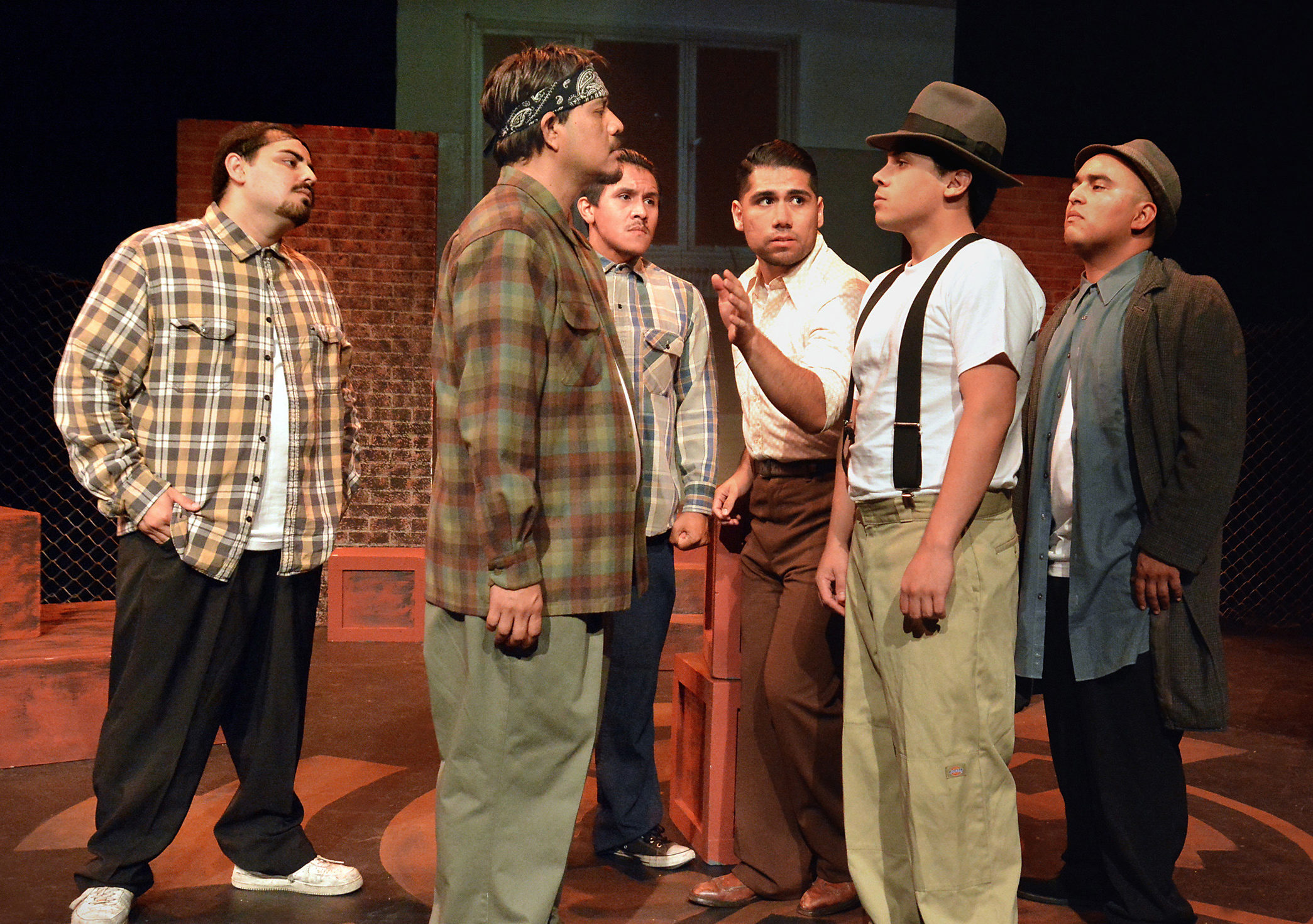[dropcap size=big]I[/dropcap]n the simplest terms, director Hector Rodriguez’s new stage adaptation Always Running is a fucking trip, a cholo coming of age story where everyone dies or gets out.
It’s as if someone went inside my brain and pulled out the heavy—traumatic, even—and impactful moments of my childhood and adolescence growing up in 90s-era Southeast L.A. That was also when I first read Always Running: La Vida Loca, Gang Days in L.A. and decided to finally stop doing or aspiring to do gangster shit.
In that way, Always Running isn’t just a play, it’s a memory personified. It’s our collective memory––those of us who were touched by the sheer force of the memoir it’s based on, by Luis J. Rodriguez, or had the dumb-luck audacity to have lived a childhood that played out similarly though not on stage but on the streets of neighborhoods colored by spray paint, police sirens, and blood. And it’s well done and even better acted by Rufino Romero (In Echo Park, Natural Vice) who plays Luis when he banged Lomas and tagged Chin.
From the moment the house lights dim and Romero’s Chin stands center stage for the first time, you are transposed into American history, a Los Angeles that existed parallel to groovy nights, Civil Rights, blowouts, and the birth of New Hollywood. In many ways, it’s like watching the George Lucas classic American Graffiti but with brown kids coming of age during the ascension of not just car culture but also cholo culture.
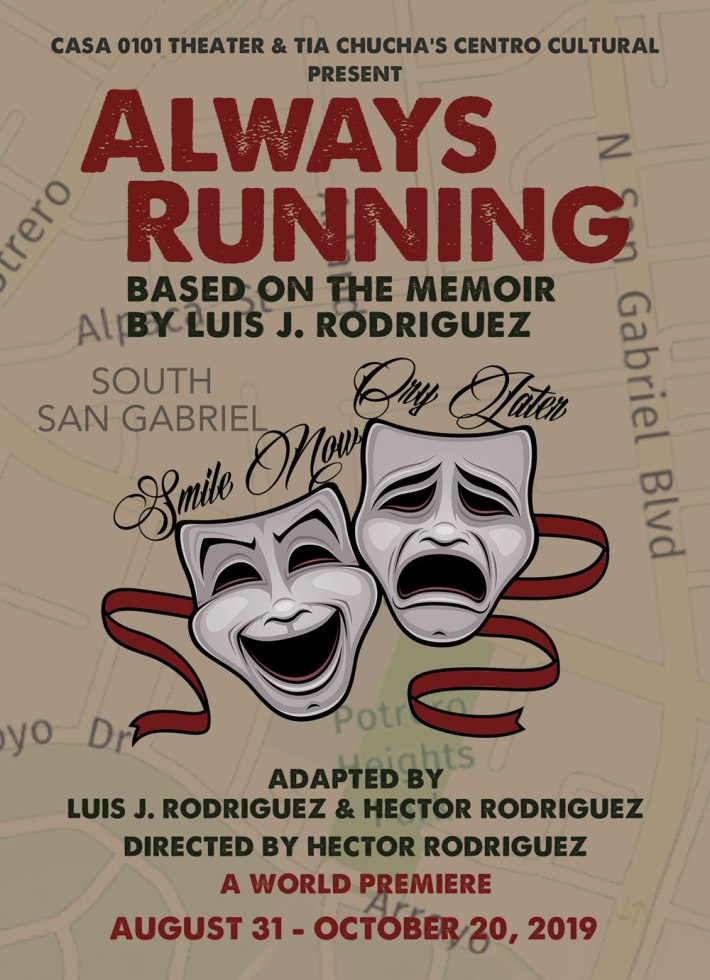
Without a Lucas Films budget or even an Off-Broadway one, Hector Rodriguez and company masterfully pull us into the world of L.A.’s once poet laureate Luis J. Rodriguez in a way only previously done by the writer’s masterful pen. It’s an impressive feat by cast and crew to bring to life the 60s and 70s Americana that you don’t often read about in Hunter S. Thompson rants, catch on Wolfman Jack’s radio show, or see in Red Foreman’s basement.
...Being in a gang was about 'protecting the barrio.'
That it's a show about Mexican Americans growing up in an iconic L.A. barrio being staged at the beautiful Boyle Heights playhouse and art gallery CASA 0101, only serves to highlight the magical realism that anchors the story’s darkest moments. Where else can you catch a play about this L.A. seated with some of the actual people who lived it? Friday night, for example, at least two former Lomas veteranos who inspired some of the characters in the book were on hand to catch the play.
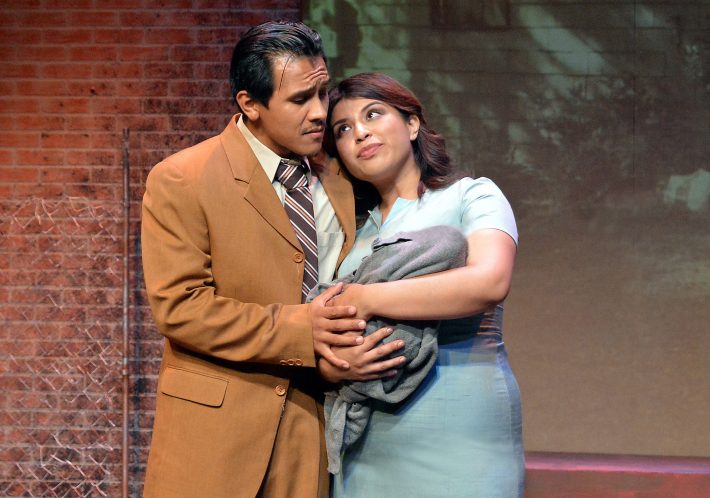
Cecil Espinoza told me he was in prison when the memoir came out in 1993. It was like talking to Neal Cassady if he had gang tattoos, Locs, and a straw fedora. “I was Chuco from Lomas, but they changed the names, you know,” Espinoza recalled. “I was in the joint when I read it for the first time and I was surprised, ‘like hey that’s me.’ Of course, like most books, it is not what it’s truly to be but for the most part, it was pretty close.”
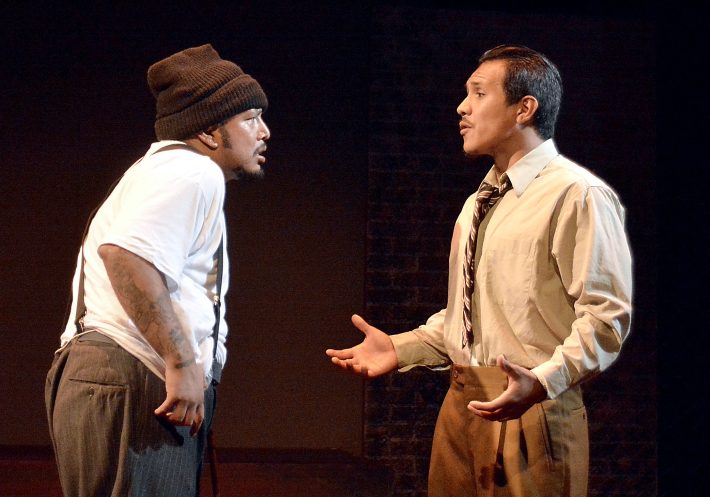
I talked to Espinoza before the play began and he said that back then, being in a gang was about “protecting the barrio.” Moments later, those words are repeated in the first act of the play, echoing in my mind from minutes ago and from 1999. You have to imagine it is precisely this level of community representation critically-acclaimed screenwriter Josefina Lopez (who is one of the play's producers) had in mind when she founded CASA 0101 in Boyle Heights almost 20 years ago.
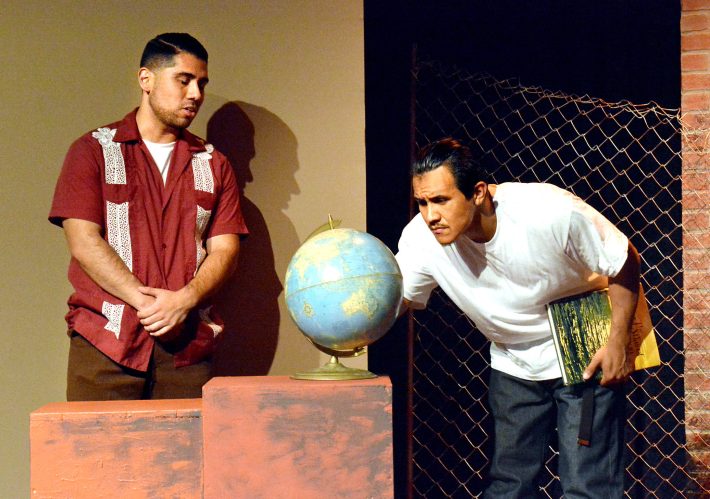
The play is not without some minor rough spots. Namely, sometimes it relies a little too heavily on dialogue exposition, perhaps a necessary characteristic of the medium. But overall it is captivating and filled with so many beautiful moments that plaster you like the graffiti on the dope set designed by Marco de Leon and produced by Wendy Castro’s team. The costume design by Adel Alvarado is also commendable.
Among the many standout performances, Joshua Nicholas creates a Chente Ramírez that starts off feeling cheesy and ends up being that grown-up you fall in love with as a mentor and father figure, much like he does in the original book and like most mentors who call you on your BS evolve in real life. And the women of the cast put in work. Haylee Sanchez, Rachel Lemos, and Alexa Ortiz play multiple roles with nuanced voices and character traits. They’re funny, too.
Alex Alpharaoh, Venacio Bermudez, Sammy Carrera, Angel Lizarraga, Jesus Tadeo Rodriguez strongly round up the all Latinx cast. And Nery Cividanis as Chava kills and drags us to a mental hell in the penultimate scene. But the true star of the show is Rufino Romero who by the end is transformed into Louie, Chin, Luis J. Rodriguez, and even into the author's mighty pen whose painful lessons and the message about the power of believing in our children, ourselves, our community, still resonate today.
In a note given to each attendee, me and Chuco included, stuck into the playbill, Rodiguez recognizes the play will “open up many wounds.”
“I dedicate this play to all our Chicano, Mexican, and Central-American barrios—and all poor and working-class neighborhoods,” he writes, “as well as the relentless struggle for our youth, our dignity, and peace in our streets.”
The play runs through October 20 and we are told it is close to selling out. Tickets are available here.
